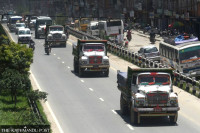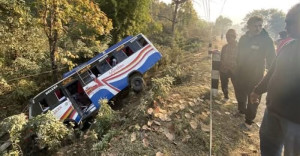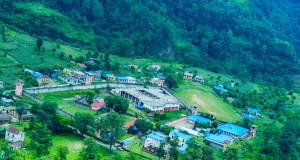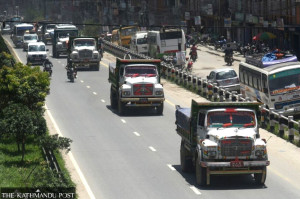Bagmati Province
Raksirang Rural Municipality in Makwanpur works towards conserving chiuri trees
Conservation of chiuri forests stands to benefit the environment as well as the Chepang community.
Pratap Bista
Raksirang Rural Municipality in Makwanpur is home to many families from the Chepang community, and butter tree, locally called chiuri, plays a vital role in the lives of these people.
Underscoring the need to conserve chiuri, and the bees and bats associated with this community, Silinge Community Forest in Raksirang ward number 6 last fiscal year launched a chiuri, bees and bats conservation campaign.
As part of this campaign, every household of the rural municipality has to plant at least 50 saplings of chiuri and make efforts to conserve the existing chiuri forests.
The deciduous plant species is not only an integral part of the Chepang’s culture but is also a major source of livelihood for most Chepangs. Most Chepang families in Raksirang are engaged in beekeeping and honey farming, a trade highly dependent on chiuri plants.
“We brought 5,000 chiuri saplings from a beekeeping resource centre in Chitwan and distributed them to the villagers in Silinge last year. Most of the saplings have grown up now,” said Aitesingh Chepang, the chairman of Silinge Community Forest Consumers’ Committee. The Fruit Development Directorate in Kathmandu provided Rs 50,000 to the community forest to conserve chiuri plants, according to Aitesingh.
“Chiuri trees help control soil erosion in hilly areas. Chiuri flowers are the main source of food for wild bees. Having an abundance of these trees will ensure a greater yield for local honey farmers,” said Achyut Lamichhane, assistant forest officer at the Division Forest Office in Hetauda.
Around 50,000 chiuri saplings were also planted in Makwanpur, Dang, Rautahat, Sarlahi, Banke, Bhaktapur, Rupandehi among other districts last year, according to Bee Keeping Resource Centre in Chitwan.
With the conservation of chiuri trees, the Chepang community hopes to continue pursuing its traditional occupation of bee farming.
“Beekeeping is the Chepangs’ traditional occupation, but of late, most of them have been forced to move away from beekeeping in light of poor yield. This campaign to conserve chiuri forests stands to benefit the environment as well as the Chepang community,” said Rameshwor Yadav, chief of Agriculture Development Office in Raksirang.
Along with chiuri, the villagers are also working towards conserving bats, the primary agent of pollination of chiuri flowers. Bat meat was widely consumed in the community, which led to a decrease in the number of these mammal birds. At present, the community forest has imposed a restriction on hunting and killing the birds.




 9.83°C Kathmandu
9.83°C Kathmandu















